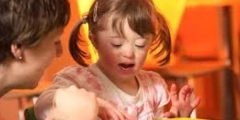Baby development in the fifth month
Many changes occur in the child's growth and the development of his skills by the fifth month of age, as the child's weight has nearly doubled during the first five months. The child also gains an additional 0.5-1 kilogram of weight during the fifth month, and approximately 2 cm of weight. Height, and it is expected that the child will begin trying to speak during this month as well, in addition to preparing to try to crawl soon. It should be noted that despite the speed of the child’s growth during the first year of life, the pace of growth may decrease in some children by the fifth month or so. Six years old.
Signs of cognitive development
Signs of a child’s cognitive development express his ability to think and make decisions, in addition to his IQ. Below is a statement of some of the signs of cognitive development that may appear on a child in the fifth month of life:
- Increasing the sharpness of acumen and intuition: During this stage, the child's intelligence and interest in foreign objects and people around him can be observed, in addition to his response by distinguishing himself in the mirror, his smile, his love of exploration, and his alertness.
- Ease of attracting attention: As the child's ability to notice strange objects and objects around him increases and his desire to explore, his attention can be easily drawn by presenting him with a new toy, for example.
- Color discrimination: The health of the eyes and retina and the coordination between them and the brain can be inferred from the child’s discrimination of different shades of colors at this age, with emphasis on his preference for bold colors during this stage of life.
- Development of basic language: At this stage, the child begins to form some repetitive, single-sounding sounds, such as repeating the letter dal or alif, while increasing the frequency of babbling or intonation without difficulty due to the development of his vocal cords.
- Note the causes and effects: During this stage, the child begins to notice the causes and effects. He may notice a sound being produced when moving some toys or objects around him, so he moves them repeatedly to produce the sound. He may also throw objects around him to the ground just to observe the result of his action. Here it is worth noting the necessity of removing breakable objects from around him. The child begins this stage.
Read also:When does childhood end?
Signs of physical development
Signs of physical development express the child’s motor skills and physical growth. Below is a statement of some signs of physical development that may appear on the child during the fifth month:
- Muscle growth: As a result of continuous muscular growth, some of the child’s muscular reactions can be observed during this stage. When the child lies on his stomach, he extends his arms and legs while arching his back. Conversely, when the child lies on his back, his ability to raise his head and shoulders can be observed, with some children being able to turn and turn over. Lying on the back means lying on the stomach and vice versa, noting that the child can push up and down when standing on the lap. It should also be noted that carrying the child and supporting him in a sitting position helps increase the strength of the back muscles, and during the next stages the child will be able to sit almost without assistance. With the possibility of him sitting without assistance for a short period that may not exceed a minute in the fifth month in some cases, here it is worth noting the necessity of placing pillows around the child to protect him when he falls.
- Putting objects in the mouth: The child may begin to put foreign objects around him in his mouth to explore them at this stage. Therefore, it is also worth paying attention and avoiding placing small objects that can be swallowed around the child. Despite noticing the child’s desire to eat solid food, the timing of introducing solid food to the child must be discussed with the doctor. However, it is recommended to sit with the child during mealtimes to strengthen social bonds with the child and increase his appetite. The child’s enjoyment can be observed while watching other people and how they eat food.
- Carry milk bottle: A child in the fifth month may be able to carry a bottle of milk without assistance and place it in his mouth, but it is preferable to avoid handing the bottle of milk to the child at this age and leaving him unsupervised to avoid excessive milk intake, choking, or falling asleep during feeding, which in turn may lead to the accumulation of milk in the The mouth and its transmission through the ducts connecting the throat and the middle ear, and the increased risk of developing an ear infection, in addition to the fact that the accumulation of milk around the teeth increases the possibility of tooth decay in the child.
Read also:Signs of dehydration in children
Signs of developing social and emotional skills
The child begins to develop some social and emotional skills during this stage, which help him communicate with the people around him, and the following is a description of some of them:
- Stress around strangers: The child may begin to become nervous and cling to one of his parents when unfamiliar people are around him, or even when familiar people are present in some cases. The child may also cry when someone approaches him or carries him. Here it is worth paying attention to the nature of this condition, so you must try to approach the child. Slowly and gently, and if the child is crying, one of the parents should hold the child and hug him to calm him down, in addition to the fact that loud noises may frighten the child and make him cry.
- Show feelings of love: At this stage, the child begins to show feelings of affection and love by trying to kiss and hug his parents, and laughing and smiling when playing with them. The child may also try to perform movements that make his parents laugh, and show his feelings in other ways, such as crying when they leave the room to show his sadness, and trying to hold on to his parents’ arms when Get close to him to pick him up.
- Interaction with others: By making some sounds to attract the attention of others, and expressing some feelings, such as hunger and boredom, in addition to the child beginning to recognize his name, understanding some words such as the word “bath,” and enjoying playing with others.
- Understanding his relationship with others: During this stage, the child begins to distinguish his relationship with his parents, family members, children, strangers, and people who care for him, and becomes attached to the people close to him and loves spending time with them.
- Many types of crying: At this stage, several types of crying can be distinguished from the child, each of which expresses a specific state, such as hunger, sleepiness, and boredom.
Read also:Sixth month vaccination
Baby sleep in the fifth month
In most cases, the child does not wake up in the fifth month during the night, and his sleep during the night can be regulated by following some advice, such as bathing the child with warm water before sleeping, then shaking or rocking gently, while speaking or intoning the child until he feels sleepy. It is also recommended to put The child is in the bed designated for him when he notices signs of drowsiness, and not waiting for his sleep to get used to calming himself down and sleeping without relying on one of his parents for this later. It is worth noting the need to ensure that the child sleeps on his back when placing him in the bed to prevent sudden infant death syndrome (in English: Sudden Infant Death Syndrome (SIDS for short). It is also worth noting that the child needs a nap during the day to maintain his sleep routine, as the child needs a nap in the morning and a nap after lunchtime. The nap time should not be delayed until the child feels tired and sleepy, but rather set a fixed time. On the day for a nap.
Tips to improve baby development in the fifth month
During this stage of a child’s life, it is not possible to separate learning and play. Among the tips that may contribute to enhancing the child’s development in the fifth month are the following:
- Talk to the child: During this stage, you can talk to the child in simple language, using uncomplicated terms such as cold, hot, cat, and other words, respond to the child’s sighs and babbling, ask him some questions, and talk to him about some different topics. Some ideas and feelings can also be conveyed to the child through manipulation. Using voice tone, facial expressions, and reading to him to help develop his understanding of language and different sounds. Singing and intonation also contribute to the development of the child’s brain.
- Encouraging the child's movement: By motivating the child to play using one of the attention-grabbing toys to encourage the child to hold his head, encouraging him to get up by holding his hands and using some motivational phrases, or having the child lie on his stomach while observing, encouraging him to turn and roll, and helping him to sit.
- Introducing simple games: It is recommended to draw the child's attention by using toys that make some sounds or music, and toys with cheerful colors, and to place the child in front of a mirror to watch his movements. It is also recommended to provide a limited number of toys at a time, not to exceed two toys. The toy can also be placed near the child to encourage him to try to approach. It is necessary to avoid using toys that may completely cover the child’s face, and to avoid playing with the child while he is sleepy or tired.
- Maintaining the child's health: By preventing his exposure to passive smoking, preventing people from smoking at home, in addition to being careful to avoid shaking the child forcefully, as this may lead to damage to the child’s brain due to weak neck muscles and their inability to adequately support the head.









